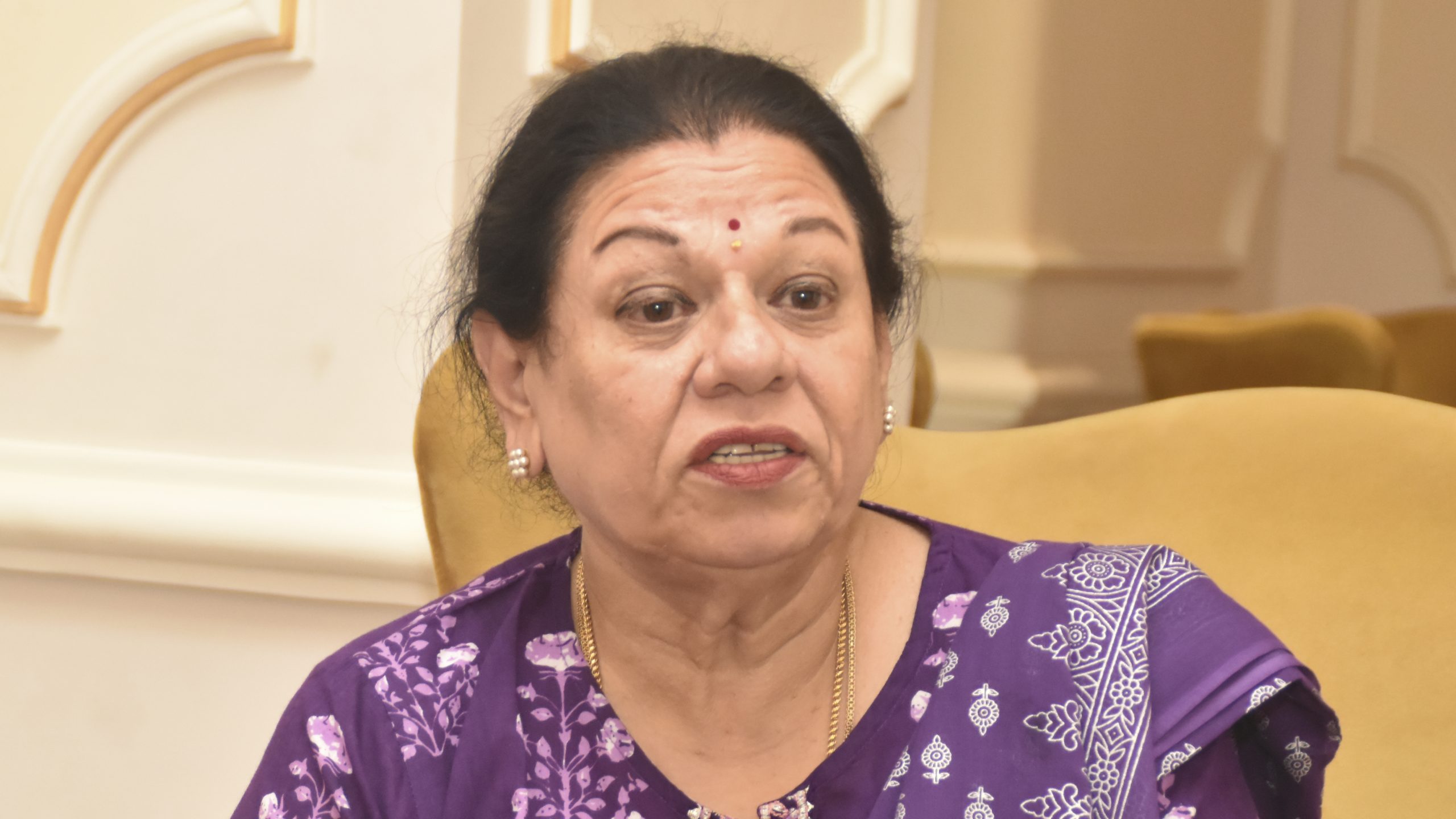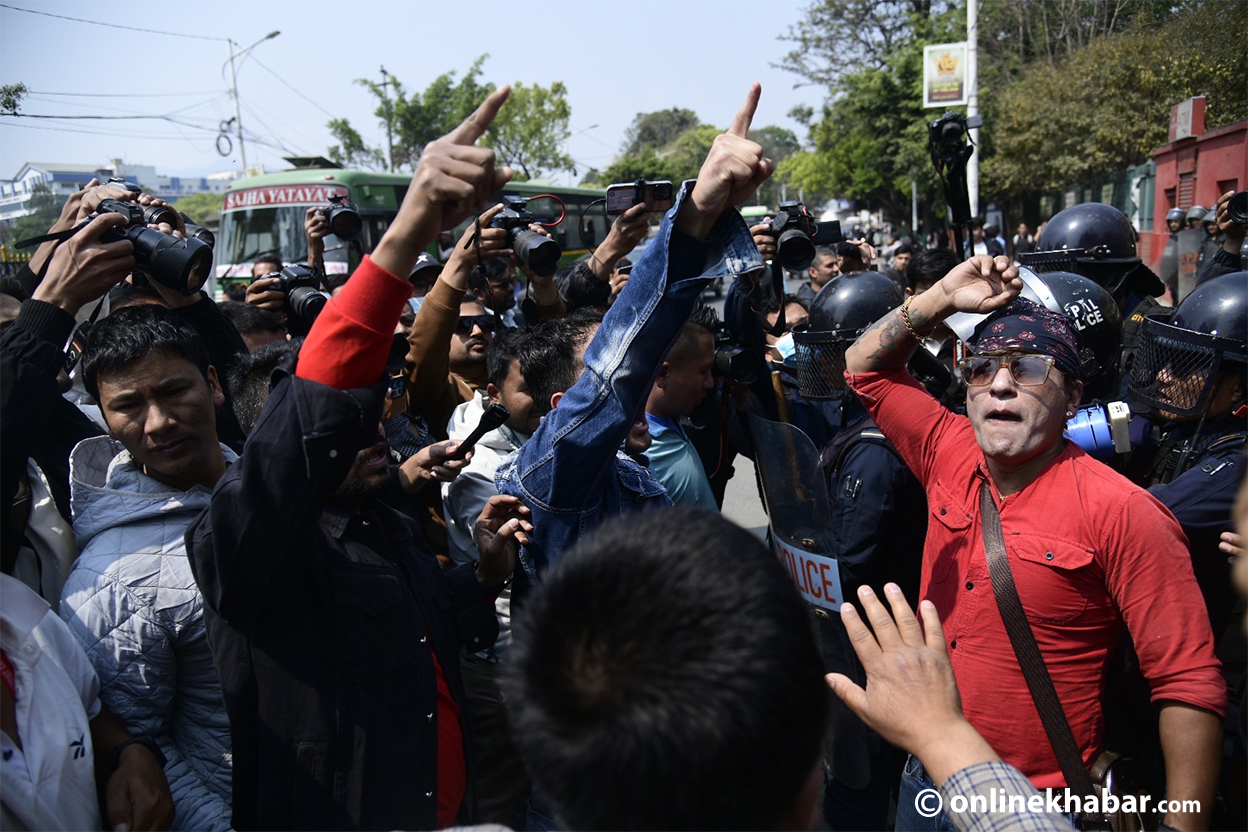Meera Khanna wants to introduce herself as a writer, but she is better known as a gender rights activist active against violence against women.
A native of India, Khanna is known across South Asia as a strong advocate of women’s rights and their empowerment. Recently, Khanna was in Kathmandu to attend the South Asian Conference on Violence against Women. On the sidelines, Onlinekhabar had a long conversation with her about the status of women’s rights, in particular violence against women, in Nepal and South Asia. Here are some excerpts of the conversation.
The reported incidents of rape and other kinds of violence against women and girls in South Asia is increasing day by day. So, in this context, who is more responsible for the situation: the government, society or culture?
South Asia is a patriarchal society. In a patriarchal society, women’s role is devalued. They are always given secondary status. In this structure, men are superior and women are inferior. There is a tendency to look at women as objects. Even if we look at the traditional customs of marriage in South Asia, there is a ritual of kanyadan, which means the women can be gifted to the men. But, a woman is not an object who can be gifted. She is a human being. So, throughout our traditions, customs and language, women’s inferior status is always being emphasised, which is why there are unequal power relationships.
However, the countries in South Asia have good laws. But, the implementation of the law is very weak here. There is a reason why the implementation is weak; the lack of awareness. The survivors of violence are not aware of the laws which can protect them. The implementation is weak also because of the lack of resources.
Yet, many societies in South Asia are in a transitional phase. Of late, there has to be great sensitisation about the issues. Hence, the number of incidents of violence that are being reported is increasing.
Do you think social values, norms and cultures are responsible to trigger the cases of violence against women and girls?
Definitely. Violence against women is not one issue, rather it has tremendous intersectionalities. You see caste, creed, gender, status, age, nationality… all these intersect into the issue of violence. That is why when we are looking at violence against women, we have to look at it holistically.
Not only in Nepal, but in all the countries of South Asia, rape and other kinds of violence against women are being reported every day. What should be done to bring these kinds of incidents under control? Do you think sex education can help?
I would like to call it not just sex education. Rather, it should be relationship education. See, there is a difference. There’s a difference between sex and sexuality. Sex education is more about biological things that you give to children to understand the biological process. But, it is more important to give relationship education. You need to understand how gender relations can take. How do you deal with each other? What is a healthy relationship based on trust, respect and the idea of giving the other person space? So I think not just sex education, it should be relationship education or gender relation education. I think that is very vital that with this, men are able to deal with women as equals as human beings.
What are the right ways for the good upbringing of the children? Especially, here, I am talking about the male child to lessen the violence against women and girls?
I’m going to talk about Mahatma Gandhi here. He is the best known South Asian figure in the whole world. He said (although not in exact words) be the change that you want to see… The first education begins at home. It is about how we raise our sons and daughters. Are we raising them equally? For example, in South Asia, after we eat food, a girl picks up the dirty plates and takes them to the sink. But, does a boy pick it up? When he does, you say, “No, no, no. Let it be. You don’t do it.” Why do we create that difference? If a woman can sweep the room, a man also can sweep the room. But, he immediately says, “No.”
We create that difference from the day a child is born. In India, we have a complete campaign in which we ask society to let boys cry. When a boy cries, you say, “Don’t behave like a girl.” But, these small things are very important… Crying is very natural.
It is important that we raise our boys to be competent, capable, educated and assertive, but more important is how do we raise our sons to respect all human beings? Not to look at them as objects, but to look at them as human beings, not to look at them as a commodity, but as a personality to respect the rights of every woman… to make them free from violence…
But, whether you talk about the Nirbhaya rape case in India or the Nirmala Pant case in Nepal, it seems justice has been severely delayed in serious cases of violence against women. Many people believe it is because of the political backing that the perpetrators have. Do you agree with them?
I am not aware of what is going on with the Nirmala Pant case currently, but the Nirbhaya case is settled now. The perpetrators have been charged and sentences have been given to them, except one who was a juvenile. But, more important about controlling violence against women than the Nirbhaya case is Justice Verma Commission, which sat and made the criminal Justice Amendment Act, by which India has taken gang rape as a very, very serious offence. Under the new law, the punishment cannot be less than 20 years and can be taken up to life.
Now, going back to your question, as to why, you know in South Asia, let me say that the wheels of justice move very slowly, but, of course, they move very definitely. The point is across South Asia, there is a culture of acceptance of violence. Until and unless we break the culture and say there is zero tolerance to violence, we cannot have violence even on a single woman in this region, the culture of acceptance will not be broken. And, of course, as I said, our justice system may be slow, but it is very, very strong and very, very sure. We say justice delayed is justice denied. But, hasty justice can be just as bad. So, I think we have to break this culture of acceptance and definitely put violence and crimes against women on a fast track because women do not have the resources to be a part of a system that might take years.
In today’s world, the forms and structure of violence are changing. Along with the traditional forms of violence, violence against women in new forms such as cybercrime is also increasing. What kind of measures need to be taken to address these new forms of violence?
I think the first point of stopping any crime is the law, but the law cannot stop the violence. So, the first part So the first point would be to make a strong implementable law, not just a law, but an implementable law. And, also the kind of education that we give our children on the protocol of using social media is important. At the moment, there is no protocol, there is no etiquette of using social media. So, we need to educate our young people on the protocol, the etiquette.
The South Asian Regional Conference has recently concluded in Kathmandu. What according to you are the achievements of the conference?
This is the first South Asian Regional Conference on the issue of violence against women and girls. But, it is not just an issue of South Asia. There is no country that does not have any problem related to violence against women. The rich countries also have a very high rate of intimate partner violence.
All these issues were discussed here. Most importantly, at the end of the two days of the South Asian Women Conference, among all South Asian women activists who were here, I have made a public call for a global treaty to address violence against women and girls. So this is very, very important because we are making a call to the globe from the global South, from our South Asian countries. So we are making that call so that governments of our region take this call and champion this treaty.























